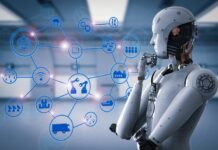The rapid evolution of Artificial Intelligence (AI) has opened up a world of possibilities that could potentially revolutionize many aspects of our lives. From healthcare to transportation, AI is already changing the way we live and work. However, as this technology advances, there are concerns that its impact on the future of humanity could be substantial. The potential benefits and risks of AI, as well as the ethical and societal implications of this technology, are complex issues that require careful consideration.
What is Artificial Intelligence?
Artificial Intelligence refers to the ability of machines to perform tasks that would normally require human intelligence, such as perception, reasoning, learning, and problem-solving. AI can be categorized into two main types: Narrow AI, which is designed to perform specific tasks, and General AI, which is designed to be able to perform any intellectual task that a human can.
Applications of Artificial Intelligence
AI has the potential to revolutionize numerous fields, from healthcare and education to transportation and entertainment. Here are some of the key applications of AI:
-
Healthcare
AI is already being used in healthcare to improve diagnosis and treatment of diseases by analyzing large amounts of medical data and providing personalized recommendations. AI is also being used to develop new drugs and treatments for diseases.
-
Education
AI is being used in education to provide personalized learning experiences for students by adapting to their individual needs and abilities. AI is also being used to develop new educational tools and materials, such as virtual reality and augmented reality.
-
Transportation
AI is being used in transportation to improve safety and efficiency by automating driving and traffic management. Self-driving cars and trucks are already being tested on roads, and they have the potential to reduce accidents and traffic congestion.
-
Entertainment
AI is being used in entertainment to create new forms of media, such as virtual reality and augmented reality. AI is also being used to personalize content for individual users by analyzing their preferences and behavior.
Benefits of Artificial Intelligence
The potential benefits of AI are significant and could have a major impact on our lives and society. Here are some of the key benefits of AI:
-
Improved Efficiency
AI has the potential to improve efficiency in many industries by automating routine tasks and freeing up time for more complex work. This could lead to increased productivity and reduced costs.
-
Personalization
AI can provide personalized experiences for individuals by analyzing their preferences and behavior. This could lead to more tailored products and services and improved customer satisfaction.
-
Improved Healthcare
AI has the potential to revolutionize healthcare by improving diagnosis and treatment of diseases. This could lead to better health outcomes for individuals and a reduction in healthcare costs.
-
Improved Safety
AI can improve safety in many industries by automating dangerous tasks and reducing the risk of accidents. Self-driving cars, for example, could reduce the number of accidents on the roads.
Risks of Artificial Intelligence
Despite the potential benefits of AI, there are also significant risks to consider. These risks include:
-
Job Displacement
One of the biggest risks of AI is job displacement, as machines and algorithms replace human workers in many industries. This could lead to significant economic and social disruption, particularly for workers in low-skill jobs.
-
Ethical Concerns
There are also ethical concerns around the use of AI, particularly when it comes to the development of autonomous weapons and the potential for AI to be used for surveillance and control.
-
Lack of Control
Another risk of AI is the potential for it to become too powerful and uncontrollable. This could lead to a situation where AI is making decisions that are harmful to humans, or where AI is able to operate outside of human control.
-
Bias and Discrimination
AI algorithms can also be biased and discriminatory, reflecting the biases and prejudices of their human creators. This can lead to unfair and unjust outcomes, particularly in areas such as hiring and lending.
-
Cybersecurity Risks
AI also poses cybersecurity risks, as AI systems can be hacked and manipulated to cause harm. For example, AI-powered autonomous vehicles could be hacked and made to crash, causing serious injury or death.
-
Existential Risks
There are also existential risks associated with AI, particularly when it comes to the development of General AI, which could potentially become more intelligent than humans and pose an existential threat to humanity.
Ethical and Societal Implications of AI
As AI becomes more advanced and widespread, there are a number of ethical and societal implications to consider. These include:
-
Accountability
As AI becomes more autonomous, it becomes more difficult to hold individuals or organizations accountable for its actions. This raises questions about who is responsible when something goes wrong.
-
Transparency
There is a need for transparency in AI decision-making, particularly when it comes to areas such as hiring, lending, and criminal justice. It is important that individuals are able to understand how AI algorithms are making decisions that affect their lives.
-
Privacy
AI also poses significant privacy risks, as AI systems can collect and analyze large amounts of data about individuals without their knowledge or consent. It is important that individuals have control over their personal data and how it is used by AI systems.
-
Inequality
There is a risk that AI will exacerbate existing inequalities in society, particularly around access to healthcare, education, and employment. It is important that efforts are made to ensure that the benefits of AI are distributed equitably.
-
Regulation
Finally, there is a need for regulation of AI to ensure that it is developed and used in a responsible and ethical way. This will require collaboration between governments, industry, and civil society to develop effective regulatory frameworks.
Conclusion
In conclusion, AI is a powerful technology with the potential to revolutionize many aspects of our lives, from healthcare and education to transportation and entertainment. However, as with any powerful technology, there are risks and challenges that must be addressed.
The benefits of AI, such as improved efficiency, personalization, improved healthcare, and improved safety, are significant and have the potential to positively impact our lives and society. However, the risks, such as job displacement, ethical concerns, lack of control, bias and discrimination, cybersecurity risks, and existential risks, must be taken seriously and addressed.
To ensure that AI is developed and used in a responsible and ethical way, there are several steps that can be taken. These include:
-
Developing ethical guidelines and regulations for AI development and deployment.
Collaboration between governments, industry, and civil society is necessary to develop effective regulatory frameworks that address the ethical and societal implications of AI.
-
Ensuring transparency and accountability in AI decision-making.
It is important that individuals are able to understand how AI algorithms are making decisions that affect their lives. This requires transparency and accountability in AI decision-making processes.
-
Protecting privacy and personal data.
Individuals must have control over their personal data and how it is used by AI systems. This requires strong data protection regulations and enforcement mechanisms.
-
Ensuring equitable distribution of the benefits of AI.
Efforts must be made to ensure that the benefits of AI are distributed equitably, and that AI does not exacerbate existing inequalities in society.
Final Thoughts
AI is a rapidly evolving technology that has the potential to revolutionize many aspects of our lives. However, as with any powerful technology, there are risks and challenges that must be addressed.
To ensure that AI is developed and used in a responsible and ethical way, it is essential that we address the ethical and societal implications of this technology. This requires collaboration between governments, industry, and civil society, and a commitment to transparency, accountability, and inclusion.
By taking these steps, we can harness the potential of AI to improve our lives and society, while minimizing its risks and negative impacts. Ultimately, the future of AI and its impact on humanity will depend on how we choose to develop and deploy this technology. It is important that we approach AI with caution, and take steps to ensure that it is developed and used in a way that benefits all of humanity.
Google News | Telegram
















